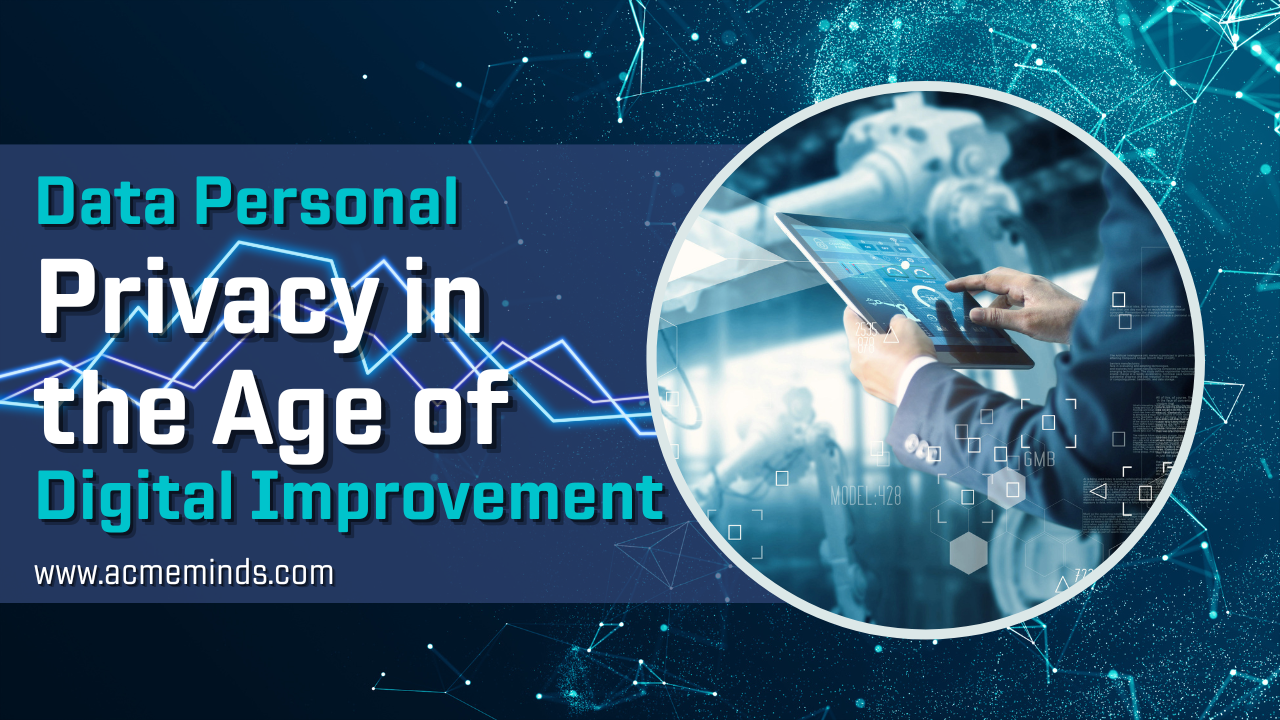Data Personal Privacy in the Age of Digital Improvement
In today’s quickly developing electronic landscape, data has become one of the most valuable properties for individuals, companies, and governments. With the extensive adoption of innovation and digital systems, organizations accumulate, keep, and process vast amounts of individual information. In fact, more than 4.5 billion data records were exposed through breaches in 2023 alone, underscoring the urgent need for robust data privacy protections (Statista). While this electronic change drives innovation and performance, it offers substantial obstacles, especially regarding personal data privacy.
What is Information Personal privacy?
Data personal privacy refers to properly handling, processing, storing, and using personal info in ways that straighten with lawful, moral, and regulative requirements. It includes securing delicate data like names, addresses, monetary information, and personal identifiers from unauthorized gain access to or misuse.
As digital transformation increases, companies rely on data-driven designs that make the security of individual information extra complex and critical.
Trick Obstacles in Data Privacy
Information Violations—Among the most considerable obstacles is the growing number of information breaches. High-profile instances like the Facebook-Cambridge Analytica detraction and major leakages from credit firms demonstrate just how susceptible personal information can be. In 2021 alone, there were over 1,862 data breaches in the U.S., revealing the personal information of millions of individuals.
Cloud Storage Space and Remote Access—As organizations shift toward cloud storage space services and remote job designs, they open themselves up to potential susceptibilities. Cloud storage, while hassle-free, can be susceptible to hacking or incorrect arrangement, causing data direct exposure.
Emerging Technologies – New technologies like expert systems (AI), machine learning (ML), and the Web of Points (IoT) bring amazing opportunities. Nevertheless, they create brand-new methods for gathering personal information, frequently without customers’ full recognition. For instance, home IoT gadgets can track use patterns and actions, increasing worries regarding user approval and openness.
Cross-border Information Transfers – Data commonly streams across boundaries in an increasingly globalized world. This increases problems around territory and compliance with various privacy legislations throughout nations. For instance, the European Union’s GDPR (General Data Defense Guideline) has strict standards for just how personal data can be managed, however, these policies might differ considerably from those in countries like the U.S., India, or China.
Governing Reactions to Information Privacy Worries
As information privacy problems increase, federal governments and regulatory bodies worldwide are implementing actions to secure citizens’ information. Some key regulations consist of the following:
General Information Defense Guideline (GDPR) – The GDPR is among the world’s most detailed data security laws. It applies to all businesses that process the data of EU residents, regardless of the firm’s area. It mandates clear customer consent, provides the right to data erasure, and imposes hefty penalties for non-compliance.
California Consumer Personal Privacy Act (CCPA) – In the UNITED STATES, the CCPA offers California homeowners the right to recognize what personal data is being collected, the right to erase data, and the right to pull out of its sale. It is typically considered one of the USA’s most detailed data privacy laws.
India’s Digital Personal Information Protection Bill 2023—As part of its growing digital economy, India has presented the Digital Personal Information Defense Bill to manage how companies accumulate, store, and process personal information. This bill aims to give Indian residents extra control over their information.
Ideal Practices for Ensuring Information Privacy
Information Encryption—File encryption ensures that even if information is intercepted, it can not be read by unapproved people. Securing saved data and information in transit is essential for protecting delicate information.
Regular Audits and Conformity-Checks Organizations ought to regularly audit their information defense protocols to guarantee conformity with the current policies and ideal techniques. This additionally assists in identifying prospective susceptibilities before they can be exploited.
Worker Training Information violations – Typically arise from human mistakes, such as phishing frauds or misconfigured systems. Regular staff member training on data personal privacy ideal practices is important for minimizing threats.
Adopt a Privacy-By-Design Approach – Privacy-by-design means embedding data security into the design of systems, applications, and processes. This ensures that privacy problems are dealt with from the beginning, as opposed to as an afterthought.
Openness with Individuals – Clear communication with individuals concerning what information is being accumulated, how it will be used, and their legal rights relating to that data is essential. Transparency promotes count between businesses and customers and ensures compliance with personal privacy regulations.
Verdict
In the age of electronic transformation, personal information privacy is no longer optional—it’s an essential requirement for protecting people’s rights and promoting trust in electronic ecological communities. As innovation advances, organizations must stay aggressive in implementing information privacy procedures that comply with legal demands and ethical requirements. Besides, securing personal information is important for developing a protected and relied-on digital future.
Strong privacy practices depend on equally strong cybersecurity foundations that protect systems, networks, and data from evolving threats. From preventing breaches to ensuring regulatory compliance, cybersecurity plays a critical role in safeguarding personal information. To understand how modern enterprises can build resilient security frameworks that support data privacy at scale, explore Cybersecurity Essentials for Modern Enterprises.
FAQs
1. What is data privacy?
Data privacy refers to the proper handling, processing, storage, and use of personal information in ways that align with legal, ethical, and regulatory requirements. It protects sensitive data such as names, addresses, financial information, and personal identifiers from unauthorized access or misuse.
2. Why is data privacy important in the digital age?
Data privacy is essential because individuals and organizations generate and store massive amounts of personal data. Protecting this data builds trust, prevents misuse, and ensures compliance with regulations worldwide.
3. What are common challenges in data privacy?
Common challenges include data breaches, cloud security vulnerabilities, new technologies like AI and IoT collecting data, and cross-border data transfers that must comply with varying global regulations.
4. What are some key data privacy regulations?
Some major regulations include the EU’s GDPR, the California Consumer Privacy Act (CCPA), and India’s Digital Personal Information Protection Bill. These laws set standards for consent, data rights, and penalties for non-compliance.
5. How can businesses ensure strong data privacy?
Best practices include encrypting data, conducting regular audits, training employees, adopting privacy-by-design principles, and maintaining transparency with users about data practices and rights.
6. How does data privacy benefit customers and businesses?
Strong data privacy builds trust, reduces the risk of breaches, ensures compliance with laws, and supports long-term customer relationships—all of which help businesses maintain a positive reputation and competitive edge.



